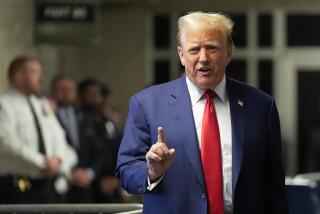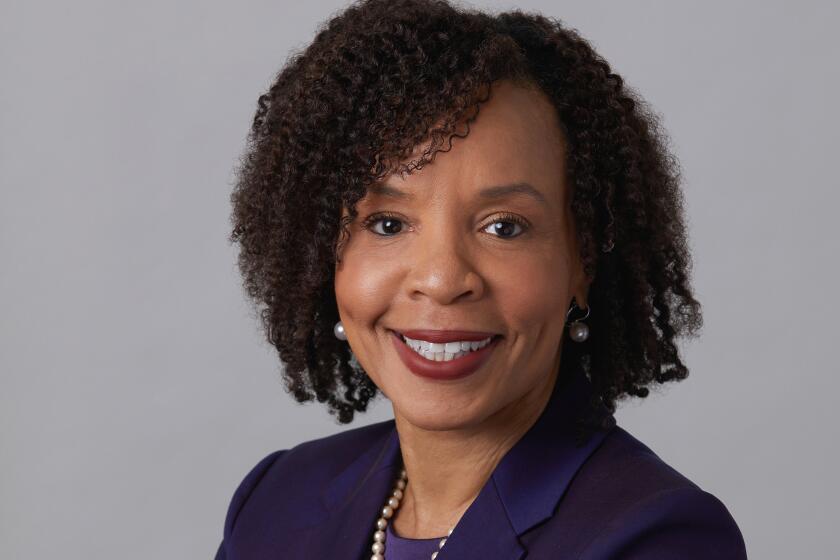Casting Call for the ‘Anti-Arnold’
Ronald Reagan. Arnold Schwarzenegger. Fred Thompson. Sonny Bono. That guy on the Love Boat. It drives Democrats batty that so many Hollywood luminaries, who are supposed to be their people, have gone on to become successful Republican politicians.
For California Democrats, it’s especially galling to face a celebrity deficit when taking on Arnold, which is why many party activists wish one of their own Hollywood heavyweights would run for governor in 2006. Rob Reiner is mentioned as a possible white knight, and Warren Beatty can’t give a speech without being asked to put up or shut up, or being called a “crackpot” by a spokesman for that lifetime serious politician, Dr. Schwarzenegger.
But Democrats are barking up the wrong tree in their search for the anti-Arnold of 2006. The power of celebrity to capture an audience is undeniable, but a star from the left wouldn’t conjure up Reagan- or Arnold-like magic. No, the Democratic equivalent of a GOP movie star candidate is a celebrity candidate from the business world.
It’s all about casting against type. What gives Hollywood GOP politicos their aura of contrarian independence isn’t so much that they are rich movie stars new to politics. It’s the fact that they have descended from behind that sign on those leftist hills, their Republican faith miraculously intact.
A Democratic movie star in politics wouldn’t have that same aura of independence, but a big-name CEO as the Democratic standard-bearer would. He or she would have emerged, their faith in the Democratic creed intact, from a world where people are supposed to be Republican.
It will be helpful to the party that its two top prospects in Sacramento -- Treasurer Phil Angelides, a former real estate developer, and Controller Steve Westly, an early eBay exec -- have been successful in the business world. But they’re already in Sacramento, which should count for something but in a perverse way counts against them, and neither can be called a celebrity.
Leftward-leaning business celebrities are admittedly in short supply, especially when you remove from contention Hollywood studio chiefs, and the history of business moguls in Democratic politics is a slim volume. Lee Iacocca once flirted with electoral politics after Washington bailed out Chrysler. Goldman Sachs alum Robert Rubin, the former Treasury secretary, and Jon Corzine, the New Jersey senator and gubernatorial candidate, are in the Averell Harriman mold of financiers who go to Washington to give Dems some street cred -- Wall Street cred, that is.
In the U.S. Senate, Maria Cantwell from Washington state is one of the few progressive dot-com executives who made the transition to politics. Warren Buffett is intriguing, if only because he insists on living in Nebraska most of the time despite being one of the planet’s richest people, and he rails against California’s Proposition 13 and applauds inheritance taxes.
New York Mayor Michael Bloomberg is the best current example of a billionaire business celebrity who has succeeded as a progressive officeholder beholden to no one. He dramatically raised taxes upon taking office and is only nominally a Republican. His out-of-the-blue candidacy in 2001 wasn’t taken seriously enough by the media because too many of my fellow journalists, who are in a state of permanent denial that they themselves toil in the tawdry private sector, have an irrational anti-business bias.
Closer to home, those who disagree with my premise that a successful businessperson would make an appealing Democratic candidate offer a two-word retort: Al Checchi. The investor and former chairman of Northwest Airlines spent a fortune in 1998 trying to win the Democratic nomination for governor, only to come in far, far behind Gray Davis. But Checchi was hardly a celebrity, and there wasn’t anything that compelling about his history of wheeling and dealing, even if he had helped turn around an old airline.
What Democrats need today to take on their Hollywood turncoat is a celebrity from California’s other creative engine, Silicon Valley. Much of the late 1990s dot-com hyperbole has died down, but there is still something undeniably progressive about the ethos of the West Coast’s high-tech world. The tech sector these days is all about empowering the individual, a theme with universal appeal. And the trend of Silicon Valley executives contributing at least as much to Democrats as they do to Republicans isn’t likely to change in an era when some elements within the GOP are intent on turning theirs into the Luddite party, as seen in the debate over stem cell research.
Up in Seattle, I’d keep my eye on Jeff Bezos, Amazon.com’s founder, as the type of creative leader with a nerdy appeal who could be a phenomenal national success for the Democrats.
But for the party in California in 2006, the choice is obvious. The most promising “anti-Arnold” Democrats could draft is Steve Jobs, the charismatic father of the iPod and the boss at both Apple Computer and Pixar studios. Jobs has a history of backing and advising Democrats. I called his office Monday, but never heard back, presumably because he was busy announcing a new choice of microchips for his computers and not because I left a message saying I wanted to gauge, on a scale of 1 to 10, his interest in becoming governor of California.
More to Read
Get the L.A. Times Politics newsletter
Deeply reported insights into legislation, politics and policy from Sacramento, Washington and beyond. In your inbox three times per week.
You may occasionally receive promotional content from the Los Angeles Times.






